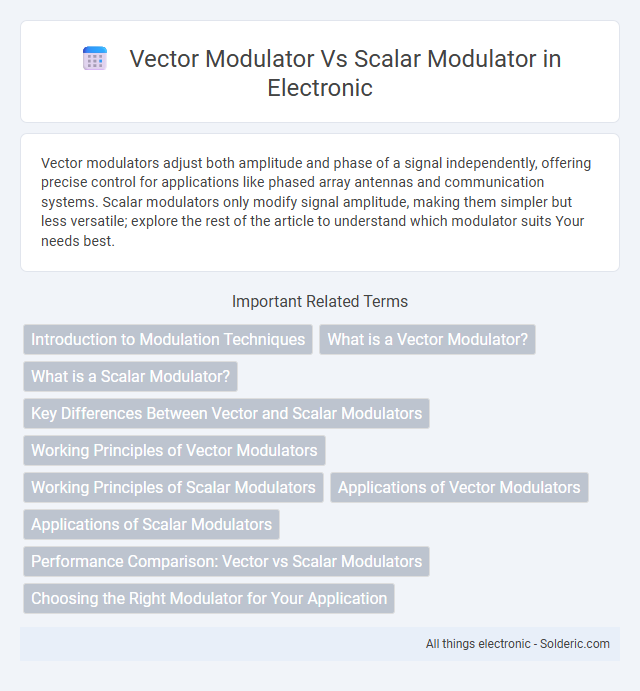Vector modulators adjust both amplitude and phase of a signal independently, offering precise control for applications like phased array antennas and communication systems. Scalar modulators only modify signal amplitude, making them simpler but less versatile; explore the rest of the article to understand which modulator suits Your needs best.
Comparison Table
| Feature | Vector Modulator | Scalar Modulator |
|---|---|---|
| Signal Control | Controls both amplitude and phase | Controls amplitude only |
| Complexity | Higher complexity due to vector processing | Lower complexity, simpler design |
| Applications | Advanced communication systems, radar, phased arrays | Basic amplitude modulation, power control |
| Performance | Better precision and flexibility in modulation | Limited to amplitude adjustments |
| Cost | Higher cost due to complex components | Lower cost and easier to implement |
| Output Signal | Vector output (amplitude and phase) | Scalar output (amplitude only) |
Introduction to Modulation Techniques
Vector modulators manipulate both amplitude and phase of RF signals simultaneously, enabling precise control for complex modulation schemes like QAM and PSK, essential in advanced communication systems. Scalar modulators adjust only the amplitude or phase independently, typically used for simpler modulation types such as AM or FM. Understanding these differences helps optimize Your signal processing strategy for improved data transmission and system performance.
What is a Vector Modulator?
A Vector Modulator is an advanced RF component used to independently control the amplitude and phase of a signal, enabling precise signal manipulation in communication and radar systems. Unlike scalar modulators that only adjust amplitude, vector modulators utilize I/Q (in-phase and quadrature) components to achieve full complex modulation for enhanced linearity and signal integrity. This capability makes vector modulators essential for applications requiring dynamic phase and amplitude adjustments with high accuracy.
What is a Scalar Modulator?
A scalar modulator controls the amplitude or phase of a signal by adjusting a single parameter, such as magnitude, without altering its directional components. This type of modulator is simpler and primarily used in applications where only signal strength or phase needs modification. Your choice of a scalar modulator suits scenarios requiring straightforward amplitude or phase adjustments without complex vector manipulation.
Key Differences Between Vector and Scalar Modulators
Vector modulators control both amplitude and phase of RF signals through complex I/Q modulation, enabling precise signal synthesis and phase shifting, essential in applications like beamforming and communication systems. Scalar modulators, in contrast, adjust only the amplitude of the signal without phase control, suitable for simpler power control or signal attenuation tasks. Your choice depends on whether you need comprehensive signal manipulation (vector) or straightforward amplitude adjustment (scalar).
Working Principles of Vector Modulators
Vector modulators operate by independently controlling the amplitude and phase of two orthogonal components of a signal, typically the in-phase (I) and quadrature (Q) components, enabling precise manipulation of the signal's vector representation in the complex plane. This approach contrasts with scalar modulators, which only adjust the overall amplitude without phase control. Your ability to fine-tune both amplitude and phase in vector modulators makes them essential in advanced communication systems requiring high-fidelity signal modulation.
Working Principles of Scalar Modulators
Scalar modulators control the amplitude and phase of a signal independently by varying the input voltage, relying on analog multipliers or PIN diodes to adjust signal levels. Their working principle involves modulating the carrier signal's magnitude and phase without directly altering the vector components, making them simpler but less precise compared to vector modulators. These modulators are commonly used in RF applications where phase and amplitude control are required but complex vector control is unnecessary.
Applications of Vector Modulators
Vector modulators are widely applied in advanced communication systems for precise amplitude and phase control of RF signals, enabling functions such as beamforming, vector signal synthesis, and adaptive filtering. Their capability to independently adjust both magnitude and phase makes them ideal for modern radar systems, phased array antennas, and software-defined radios. By choosing a vector modulator, you can enhance signal fidelity and system flexibility in complex modulation schemes.
Applications of Scalar Modulators
Scalar modulators are widely used in applications requiring precise amplitude control, such as automatic gain control in communication systems and signal leveling in test equipment. Their simplicity and cost-effectiveness make them ideal for amplitude modulation in radar systems, where accurate signal strength manipulation is critical. You can find scalar modulators integrated into instrumentation for measurement and calibration, ensuring consistent signal amplitude without the complexity of phase control.
Performance Comparison: Vector vs Scalar Modulators
Vector modulators offer superior performance compared to scalar modulators by providing precise amplitude and phase control, enabling improved signal quality and reduced distortion in RF applications. Your system benefits from enhanced linearity and accuracy with vector modulators, making them ideal for advanced communication systems requiring complex modulation schemes. Scalar modulators, while simpler and lower-cost, lack this level of control and typically result in less efficient signal manipulation and higher error rates.
Choosing the Right Modulator for Your Application
Vector modulators manipulate both amplitude and phase of RF signals, making them ideal for complex signal processing tasks like adaptive radar and communication systems requiring precise phase control. Scalar modulators adjust only the signal amplitude, offering a simpler, cost-effective solution for applications where phase information is less critical, such as basic amplitude modulation or power control. Evaluating your system requirements for phase accuracy, complexity, and budget will guide the optimal choice between vector and scalar modulators.
Vector modulator vs scalar modulator Infographic

 solderic.com
solderic.com